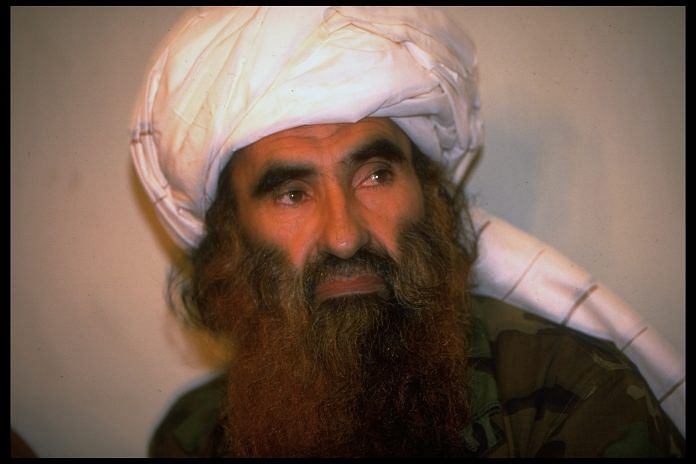The US, which named the Haqqani Network as a terror group, is now circling back into the Af-Pak arena, hoping to end its longest war.
In September 1996, as the Pakistan-backed Taliban overran Kabul, entered the UN compound, put a bullet into the head of India’s friend and former president Najibullah and then dragged his castrated body through the streets before they hung it from the nearest traffic lights’ pole, minister Jalaluddin Haqqani sat on the sidelines and watched.
The founder of the much-feared Haqqani Network, and the man widely held responsible for introducing the crude art of suicide bombing in Afghanistan, Haqqani will go down in history for his ability to play all sides in the Great Game that is Afghanistan.
As he died at the age of 79, somewhere inside Afghanistan this September morning, he will be remembered as one of the key men who steered the course of the US war against the godless Soviets for the most part of the 1980s. When the famed Red Army crossed the Amu Darya in 1989, humiliated and hurt 10 long years after it had come to fight in Afghanistan, Haqqani could have taken a substantial part of the credit.
He was the man CIA chiefs supplied bags and bags of cash to train fighters from his Zadran and other Pashtun tribes to take on the enemy. The US president at that time, Ronald Reagan, hailed him as a “freedom fighter”. Charlie Wilson, the former US legislator who believed God himself wanted the war against the Soviets, described Jalaluddin as “goodness personified”.
Also read: Releasing Taliban prisoners or changing the Constitution won’t buy peace for Afghanistan
He was the key liaison between Arab fighters like Osama bin Laden, Ayman al-Zawahiri and the Afghan underground. When the Americans bombed Afghanistan soon after the September 11 attacks, Mullah Omar seconded Jalaluddin to get the Arab fighters to safety.
Haqqani was always grooming his son to succeed him. Sirajuddin Haqqani inherited his father’s terrorist network and was responsible for carrying out an attack in Kabul at the gates of the Indian embassy in 2008, in which Indian diplomat Venkat Rao and the defence attaché were killed along with several others. Sirajuddin is now a deputy leader of the Taliban.
Sirajuddin also inherited his father’s links with the Pakistani intelligence agency, the ISI. The Haqqani Network is described by the Indian establishment as “the worst, the cruellest” terrorist network forged by the Pakistanis against India. The Haqqanis were initially mandated only to attack Indian or US targets inside Afghanistan, while the Lashkar-e-Taiba (LeT) was mandated to destabilise Indian entities inside India. But that distinction has become passé in recent years because the LeT’s footprints are found inside Afghanistan as well.
The death of Haqqani is not expected to affect the operational strategy of the Haqqani Network because the father had passed on the baton to Sirajuddin and several of his other sons several years ago.
But in his death, the old truism about the circle of life rings true. The Americans, who named the Haqqani Network as a terrorist group in 2012, are now circling back into the Af-Pak arena, hoping to end their longest war. They have opened talks with the Taliban in Doha, Qatar – Alice Wells, the senior diplomat for South Asia, met Taliban representatives in July. A second round of talks this September is on the cards.
The Trump administration is signalling that it is determined to cut the umbilical cord with Pakistan that his predecessor Ronald Reagan, more than any other US president, helped establish. The recent $300 million severance of the US-led Coalition Support Fund to Pakistan is a sign that Trump means business. He has said often enough that Pakistan cannot take US money to fund terror organisations like the Haqqani Network, who then embark on terror attacks that kill and maim Americans.
The visit by US Secretary of State Mike Pompeo to Pakistan for a few hours on 5 September, en route to India for the 2+2 defence and foreign minister-level talks, is intended to drive home that message – that terror and talks cannot go together.
Pompeo and India may as well be reading from the same page of the book.
Soon, Trump is also likely to announce a special envoy to Afghanistan. Zalmay Khalilzad is of Afghan origin and was America’s first envoy to Kabul after the Taliban were thrown out by December 2001.
Also read: Imran Khan’s existential crisis in Pakistan: To cut or not to cut defence expenditure
As for the Soviets – well, many are Russian now – 29 years after the Russian Red Army commander Boris Vsevolodovich Gromov crossed the Amu Darya and left for Moscow, the Kremlin is rekindling its interest in the Afghan theatre again.
Zamir Kabulov, Putin’s special envoy to Afghanistan, is pushing for improvement of relations with Pakistan – much to India’s chagrin. He believes that since the Pakistanis hold the key to stability in inner Asia, it is better for Moscow to keep its enemy close.
No one need tell Kabulov, especially no one in New Delhi, that arrogance is the graveyard of empires. And, that the Soviets had once exactly the same idea as did the Americans. Of course, Trump is now desperate to get out.
As for India, they waited and watched and twiddled their thumbs the way P.V. Narasimha Rao was much inclined to do as Najibullah waited for a plane to take him to safety in Delhi.
As the Mujahideen minister Haqqani watched, Delhi dithered and dithered. In the end, the Pakistani-backed Taliban walked into Kabul and without fuss put a bullet into Najib’s head.
Haqqani didn’t bat an eyelid. Another season of The Great Game had begun.



